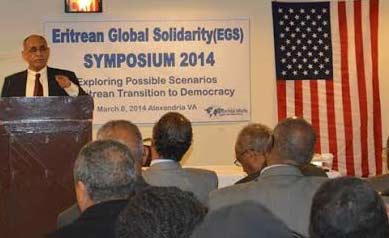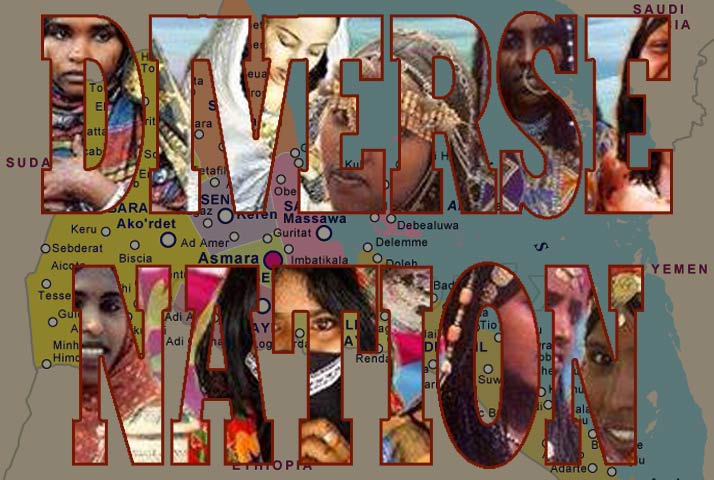Political Dialogue Symposium Needed

[This is a speech presented on March 8, 2014 at the Eritrean Global Solidarity (EGS) Symposium, in the metro Washington-DC, on the general theme: Exploring possible scenario for Eritrean transition to democracy]
The Current Situation of the Eritrean Political and Civic Struggle:
The Need of Symposium for a Political Dialogue
Dear Compatriots and Honorable guests,
I am glad to be here and have the opportunity to share my view and my perspectives with you on the current situation of the Eritrean political and civic struggle; and why we need a symposium at this critical time of our history.
Obviously there are clear misunderstanding about the concept and the role of civic society in the Eritrean political landscape. Because Civic organizations are perceived as mass organizations formed for the servitude of the existing political organizations similar to that of the liberation era, I will try to show the distinction between the two. So, before I move to the current situation of the opposition camp in general, I would like to give a general glimpse about the integral role of civic society in enhancing the current struggle and eventually in establishing a democratic governance and rule of law in Eritrea.
But what is civic society? Civic society is a concept of social science that touches the political life of a society and the public engagement in promoting the ideals of democracy and rule of law. Indeed, democracy requires an adequate level of civic capacity bounded by objective and subjective reality. In countries that have established democratic regime there has been a broad interest in popular engagement in their political life and everything that touches in the way political culture or basic human values are affected by the states governing them, and how strengthened civic society could contribute to conflict resolutions.
Despite of the fact that there are no universally accepted definitions, there are general parameters that scholars and academicians have seemingly agreed to the characteristics of the concept. And they are as follows [1].
- Civic society refers to voluntary participation of conscious citizens without the coercion of the state.
- Civic society includes all forms of voluntary participation be it public or private sector, political or apolitical.
- Civic society includes not only the individuals who participate but also the institution they participate.
- Civic societies thrive to bring civic culture and legitimate civic government and all its institutions that could be trusted by the public at large.
Why is civic society a factor for change? To understand its role one has to see the dynamic interplay of civic society, civic culture, and social capital in strengthening democracy and sometimes in conflict resolutions. Clearly the interdependent of these trio-concepts depict that one can’t bring change without the interplay of the other two. Furthermore, Robert Putman also linked with “bonding and bridging” [2] as factors in the interplay to facilitate and bring the needed change. For Putman, in a given social capital with civic culture, individuals form bonds to form civic organizations whereby the various civic organizations make a kind of bridging to effect a social movement for the common good.
In a developed countries (like the western countries), according Habermas, civil societies are an ideal case when state institutions are receptive to the inputs of civil society as an arena of democratic policy consultations. In the contrary though, in the developing countries, it is “the battle field between democrats and dictators (Jehle, 1994 pp-154). So, civic society is not free of politics. Indeed it is also a political space in the struggle for political decency and political struggle though limited to advocacy. In a state where government usurped the whole society, civil societies have to articulate their selves in anti-state way. In fact Vaclav Havel warned us that if civil societies claim as apolitical, it is illusionary vision of “paradise lost”. That is why Both Gramsci and Habermas defined civil society as a political project (Chandhoke, 2001).
Civic Societies are not without enemies. John A. Hall a professor at McGill University in Montreal has identified five distinct enemies of civil society [3].
- Despotism: This is the idea of fear which discourages any type of group that is formed between society and government
- Revival of Republican civil virtue: These are qualities that hold a moral values or moral principle and amount to dispositions to obey.
- Specific form of nationalism: This would be where the rule of majority wins, and assimilation is used in order to form an ideal society.
- Essentialist cultural ideals: These are social cages of individuals that determine the function and value of that person in society.
- Totalizing ideologies: This is an exclusive worldview that doesn’t allow an equally valid worldview.
Clearly from John Hall’s distinct premises, we have witnessed that “state despotism” controls the infra-structural power of Eritrean politics and disallowed any civic activities and civic space in the Eritrean social space – “ a structural space that should develop from the interaction of actors whose actions are reconciled and which is accessible analytically” (Heidrun Zinecker, 2011). In other words civic society as non normative structural space is an independent structure to counter balance the state. In such realistic scenario, EGS as civic society, is striving to fulfill what Helmut Dubiel (Dubiel, 2001, pp-135) characterized it “the aura of unfulfilled theoretical promise” in the Eritrean society.
Apparently, when the public mass moved by plebiscitary rhetoric’s we have to look at the pathology of democratic public sphere in order to see the distinction of rhetoric and deliberation.
Plato in his attack on rhetoric’s indeed became the first who articulate the pathology of democratic public sphere. He argued much for deliberative theory designed to study through a small scale of deliberative venues than public mass. I believe the intention of this symposium is to design a deliberative venue to study and identify the political crises of our nation. In doing so, and in the final analysis, the debate will eventually help us to chart an exit strategy and to the formulation of transitional path to democracy and rule of law.
The broad informal public sphere cannot be deliberative. In fact mini-publics that are designed settings can achieve and maintain standards of critical dialogue and can be molded to do so (Fish kin 1997, Fung 2003, Brown 2006). Plato’s objection of rhetoric is not of its appeal to passion. His strongest objection is that rhetoric is monological rather than dialogical. For him it is dialogue that change rhetoric to deliberative resolutions. Deliberation as dialogue, initiate reasons and enhances the epistemological status that brings the weak arguments into light. Indeed the plutonian cogent argument is the right venue for our political deliberative resolutions as a special interest in our pursuit.
Since the evolvement of the concept of public sphere as a space between private individuals and government authorities during the renaissance in Western Europe, a lot of structural transformation has taken place within the activities of civil organizations. Jorgen Hagerman, a German sociologist and philosopher was the first who examine the structural transformation of public sphere. The most important feature as it existed in the 18th century was that the public use reason in a rational-critical-debate to check the domination by the state or illegal use of power. He saw the public sphere as developing out of the private institutions and form what we call “literary public sphere” and its role is a way for civil societies to articulate their interest (Hagerman). Eventually the literary public sphere developed into political public sphere.
Despite of the non-existent of public sphere and civic societies inside Eritrea, the Diaspora Eritreans have formed the Eritrean public sphere (like this symposium) and civic organizations (like EGS) in order to foster a culture of dialogue between the public and the existing political organizations in the opposition camp – a culture we foresee to introduce to the nation “Eritrea” as we go forward. The Eritrean governance and its institutional structure outlawed the development of public sphere and made their own battle in the Diaspora to stiffen the engagement of the public in the existing civil societies. The challenge for the civic societies is how to boost the low public and media engagement to resist the tyrannical regime.
The political organizations in the opposition camp, as in Hegel’s words are a plethora of interests competing with one another without considerations of the common good or the public interest. They can’t see the universal will of Eritrean society for uniting practical reasoning to fight the oppressive regime in Asmara. Since all their activities are on resentment-based appeal, their policy apparatus are shrinking from time to time losing the public support. It is at this crucial time that the civic societies like EGS and NECS-in-Europe took a courageous step to have an engagement with the political organizations, to create an inflection point by changing their political curve to reverse the public mood.
Indeed, when Alexander de Tocquelle started to characterize Civic society as the schools of democracy where democratic thinking, attitude, and behaviors could learn with the aim of defending the individual and group rights, it has received an impeccable traction and enhanced the democratic struggles around the world. The Eritrean civic societies that are formed around 2008 was then strictly for the following defined purposes:
- First, it was to enable citizens to respond to the crises peacefully against the madness of the regime in Asmara.
- Second, to positively influence the existing political organizations in the opposition camp.
- Third, to educate the public the difference between the civic sphere and the sphere of political organizations in which the later will eventually be the political infra-structure of the civic-state Eritrea.
- Fourth, to aware the international community about the tyrannical regime of Asmara, by appeals, messages, and peace declarations.
So on the bases of these premises, the civic organizations are working with the existing political organizations in tandem like a two wheeled carriage, to bring a fundamental change in Eritrea. Perhaps it is more instructive to point out, that the purpose of the engagement was to influence and create effective modern organizational climate and to transform the organizational culture of the existing political organizations. But there are distinct difference between organizational climate and organizational culture. Organizational culture is the basic assumption and beliefs that are shared by members of the organizations (Schein 1985); while organizational climates are the psychological environments in which behavior of individuals occur (Otto 1998). The political organizations do not posses good relationship of ethical work climate. And so far, there is no ethical-climatic-construct where the different political organizations could behave collectively in the struggle against the Eritrean regime. Some of the active engagements of the civil societies were to insure the active participation of the Diaspora Eritreans in the political process where the “National Conference” and the “National Congress” were held to form the “National Assembly” in exile.
But, since the political organizations are the infra-structures of any particular form or system of government, EGS perceives that the relationship of political organizations and civic societies in the opposition camp is the mirror image to the relationship of the state and the public sphere for future Eritrea. From this conceptual understanding, EGS has engaged in the national conference and national congress in 2010 and 2011 respectively, where political organizations, civic societies, and independent intellectuals had assembled to chart a coordinated struggle against the tyranny at home. In short the aim of participating EGS in the aforementioned Politico-public-forum was to foster a culture of dialogue between the public and the existing political organizations in the opposition camp – a culture we foresee to introduce to our nation Eritrea. Unfortunately, because of the deep mistrust among the existing political organizations, the current struggle is at its stalemate. Therefore, we are here to change the state of the opposition camp that is strayed outside the bounds and failed to maintain exemplary decorum in their political houses.
As we all know, the doors of democracy always remain open for the systematic discovery of a better and more relevant concept and exercise of democracy in time with each and particular socio-cultural reality [Habtamu Alebachew, 2014]. Henceforth, Our speakers will tackle to clarify the three different concepts for which the term democracy are employed (a) democracy as process with all its mechanisms and procedures from political organizations (parties) to elections (b) democracy as state or condition which implies for a given civic society and its governance (c) democracy as an outcome putting into practices by the governed those agreed upon by the process.
Hence, here now, EGS with its indefatigable spirit has sponsored this symposium and assembled notable intellectuals’ and academicians to educate and explore an exit strategy from the current dilemma we are in. With that I will turn the floor to Mr. Berhane G/Negus the chairman of the board of EGS to run the rest of the program.
Thank you for listening and enjoy the rest of the program.
References
[1] Civil society, an agreed definition (2003) available from htt://pages.Britishlibrary.net
[2] Robert putman, Bowling alone, New York, Simon & Schuster, 2000.
[3] Hall, J. A and F.Trent Mann, Civil Society: A reader in history, theory, and global politics, 2005.




Awate Forum